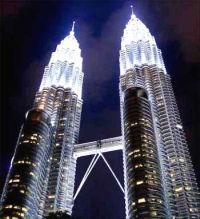 The trans-Atlantic financial crisis of 2008 and the consequent slowdown of western economies, the sustained rise of China and India's more recent promise have made many assume that the 21st century will be an "Asian century", with more than half of the world's GDP coming from Asia, much like a couple of centuries ago, before the Industrial Revolution and colonialism gave Europe and the West an edge over China, India and the rest of Asia.
The trans-Atlantic financial crisis of 2008 and the consequent slowdown of western economies, the sustained rise of China and India's more recent promise have made many assume that the 21st century will be an "Asian century", with more than half of the world's GDP coming from Asia, much like a couple of centuries ago, before the Industrial Revolution and colonialism gave Europe and the West an edge over China, India and the rest of Asia.Not necessarily, says a useful reality check from the Asian Development Bank.
The report titled "Asia 2050: Realising the Asian Century", unveiled at last week's annual meetings in Hanoi, says merely because east- and south-Asian economies, and recently India, have done well over the past quarter century does not mean they will continue to do that without addressing a range of challenges.
These include making the growth process more socially inclusive and regionally balanced, managing urbanisation, harnessing energy and water, and generating new technologies.
The report identifies the performance of seven countries as being key to Asia's sustained rise - these are China, India, Indonesia, Japan, South Korea, Malaysia and Thailand.
It lists six specific challenges facing these and other Asian economies:
i. Large and, in some cases, increasing inequities within countries that could undermine social cohesion and political stability;
ii. The risk of some countries falling into a "middle income trap" owing to a host of domestic economic, social and political challenges;
iii. Intense competition for finite natural resources (such as energy, water and fertile land) unleashed by this growth, as the newly affluent Asians aspire to higher standards of living;
iv. Rising disparities across countries and sub-regions that could destabilise the region and
halt its growth momentum;
v. Global warming and climate change (including increased natural disasters), as well as associated water shortages, that could threaten agricultural production, coastal populations and numerous major urban areas; and
vi.
Almost all countries face the overarching challenge of governance and institutional capacity.
To deal with these and other challenges, Asian countries need national strategies, regional institutions and global cooperation.
The message for India, a middle-income country, is that its key challenge has to be to avoid falling into the "middle income trap", like many Latin American economies and some south-east Asian ones that went through a phase of high growth and got stuck, not making the leap into high-income status.
Middle-income India should, in addition to further reducing inequalities and consolidating the fundamentals of development, train "a world-class skilled labour force and build credible and predictable institutions that protect the property (physical and intellectual) rights and allow fair dispute resolution" and continue to build an investment climate conducive to business development.
The report specifically calls for policies that would help transform financial systems so that they "support development of the real sector while promoting stability and minimising volatility in the markets; manage the challenges of rapid urbanisation; dramatically improve the efficiency of energy use and other natural resources; and promote innovation and entrepreneurship for enhanced productivity and competitiveness".
The ADB report is a useful reality check.
It warns Asia that much more homework and regional cooperation are needed before the East can hope to catch up with the West.










